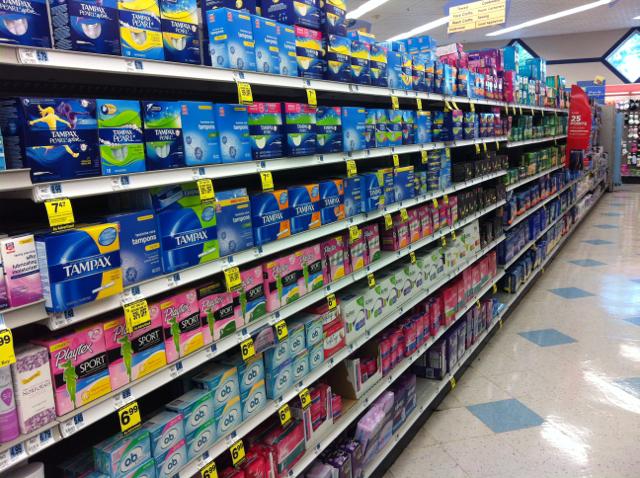Washington, DC–(ENEWSPF)–February 26, 2016. Feminine care products sold in France may contain “potentially toxic residues,” according to a study conducted by 60 Millions de Consommateurs, a French consumer rights group. The study finds traces of chemicals, such as dioxins and insecticides, in 5 of 11 products tested. A separate analysis conducted by Corman, a manufacturer of feminine care products, also finds residues of the weedkiller glyphosate, which was classified in March 2015 as a probable carcinogen by the International Agency for Research on Cancer (IARC).
 Researchers at 60 Millions reported finidng traces of halogenated waste, a by-product related to the processing of raw materials, in Tampax Compak Active Regular Fresh tampons. The
Researchers at 60 Millions reported finidng traces of halogenated waste, a by-product related to the processing of raw materials, in Tampax Compak Active Regular Fresh tampons. The
researchers also detected residues of organochlorine and pyrethroid pesticides, linked to a wide range of adverse health impacts, in some Always sanitary towels. Highly toxic dioxins, which can be cause cancer, reproductive and developmental problems and damage the immune system, according to the World Health Organization, were also found in products by OB and the European Nett brands.
Corman, which makes Organyc panty liners, told the Agence France-Presse (AFP) news agency that it conducted its own analysis that confirmed the trace amounts of glyphosate, the active ingredient in Roundup weedkiller, in its cotton-based products. A spokesperson for Corman said residual traces of glyphosate were found in one sample that “should not have been present in organic cotton.”
The findings caused the company to withdraw a batch of 3,100 boxes of sanitary towels on sale in France and Canada.
Glyphosate, produced and sold by Monsanto, is touted as a “low toxicity” chemical and “safer” than other chemicals by industry. However, glyphosate has been shown to have detrimental impacts on humans and the environment. Given its widespread use on residential and agricultural sites, its toxicity is of increasing concern. Previous studies have linked the toxicant to non-Hodgkin’s lymphoma and multiple myeloma.
“Even though the percentage of residual toxins found in the specific sample was minimal and not proven to be dangerous we decided to withdraw products from one lot as a precaution,” the spokesman added. “For us, the most important thing is the safety and health of our customers.”
The report has caused France’s National Institution for Consumers to demand that the government enforces stricter controls on feminine hygiene products and greater transparency through labeling, The Local reported.
Beyond Pesticides has long advocated a regulatory approach that prohibits high hazard chemical use and requires alternative assessments. Beyond Pesticides points out that the current pesticide regulatory system relies on risk assessments that allow public exposure hazards and uncertainties deemed acceptable by EPA, despite he availability of less or non-toxic alternative practices and products that are effective, such as organic agriculture.
Sources: Independent, http://www.beyondpesticides.org
All unattributed positions and opinions in this piece are those of Beyond Pesticides








